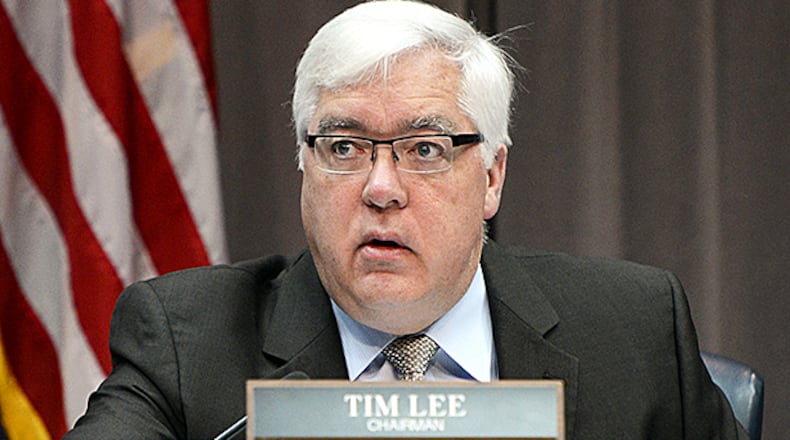Passages from Chairman Tim Lee’s letter, published Sunday in the Marietta newspaper, compared to passages from a letter written by Kentucky victim advocate Mary Lynn Houlihan and published in the Lexington Herald-Leader in May:
Lee: "Please remember not only the good works done by police in our community but that for every badge, there is a person, family and friends behind it who care."
Houlihan: "Please remember not only the good works done by police in your community but that for every badge, there is a person, family and friends behind it that care."
Lee: "Our public safety officials are exposed to some of the worst things humans can do to one another, and those are often images that stick with them forever."
Houlihan: "They (police) are exposed to some of the worst things humans can do to one another and those are often images that are forever seared into their brains."
Lee: "…we are privileged to have good, solid, honorable men and women who take pride in their jobs protecting our community every single day."
Houlihan: "… (police) have been good, solid, kind men and women who take pride in their job protecting our community."
Lee: "It is wrong to consider someone a potential criminal just because of the color of their skin. It is also wrong to criticize, blame and question one's integrity because of the uniform he or she wears."
Houlihan: "It is wrong to consider someone a criminal just because of their skin color. It is also wrong to target someone for blame because of the uniform they wear."
How we got the story:
Reporter Dan Klepal received a tip that a passage in Cobb Commission Chairman Tim Lee’s letter to the editor, published Sunday in The Marietta Daily-Journal, contained a passage that was nearly identical to one in an article written by a victim’s advocate in the Fayette (County, Kentucky) Commonwealth Attorney’s Office. Upon reviewing both pieces, the AJC found that there were four passages in Lee’s letter that appeared to be taken directly from the Kentucky article, which was published as a letter to the editor by the Lexington Herald-Leader in May. Lee’s deputy chief Kellie Brownlow told the AJC during an interview that she authored the letter, and admitted taking passages from the Kentucky letter without telling Lee.
A letter to the editor, purportedly written by Cobb Commission Chairman Tim Lee and published in a local newspaper , contained several passages taken from a letter published in a Kentucky newspaper in May.
The letter, signed by Lee, was written in support of police and published Sunday in The Marietta Daily Journal. It was also submitted for publication to The Atlanta Journal-Constitution Aug. 20. None of the phrases lifted from the Kentucky newspaper was attributed to another source.
“Please remember not only the good works done by police in our community but that for every badge, there is a person, family and friends behind it who care,” Lee’s letter says.
Mary Lynn Houlihan, director of victim services at the Fayette (Ky.) Commonwealth Attorney’s Office, wrote a nearly identical passage in her letter, which was published May 11 in the Lexington Herald-Leader.
“Please remember not only the good works done by police in your community but that for every badge, there is a person, family and friends behind it that care,” Houlihan’s letter says.
Three other passages in Lee's 13-paragraph letter have sentences or paragraphs that are nearly identical to Houlihan's letter. Houlihan did not return a phome message left at her office Monday.
Kellie Brownlow, who makes $105,000 a year in the executive role of deputy chief in Lee’s office, said she authored the letter for Lee, and acknowledged in an interview with the AJC that she took passages from Houlihan’s text. Brownlow said she did not tell Lee about using entire sentences from another source.
Brownlow said it is “common in political discourse for rhetorical phrases and language that concisely makes the point, or words that work, to be repeated.”
But Edward Queen, director of the D. Abbott Turner Program in Ethics and Servant Leadership and coordinator of undergraduate studies at Emory University’s Center for Ethics, said lifting entire phrases of someone else’s work without attribution is considered plagiarism. And Queen said plagiarism is an ethical issue.
“You basically are taking other people’s ideas and thoughts and your passing them off as your own,” Queen said. “So, at its core, it’s misleading. And misleading someone is unethical. Clearly, this is a case where they’re passing off this writing as his own thought.”
While answering several different questions in the AJC interview, Brownlow referred to the words taken from the Kentucky article as “rhetoric” and said the passages represent Lee’s viewpoint.
“Well framed phrases and words are commonly repeated in public discourse. This was a letter to the editor, not an academic paper,” Brownlow said.
Joe Kirby, the MDJ’s editorial page editor, said he was not aware that Lee’s letter used unattributed passages from another source, and said that might have impacted the newspaper’s decision to publish it. The AJC has decided not to print the letter.
Lee did not answer directly when asked Tuesday if it is acceptable for his deputy chief to plagiarize in his name: “I’m not sure where you’re going, but it doesn’t change the intent of the message, and that’s all I have to say about that.”
About the Author
Keep Reading
The Latest
Featured




